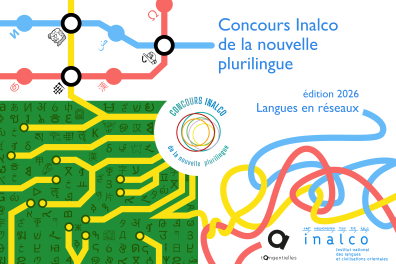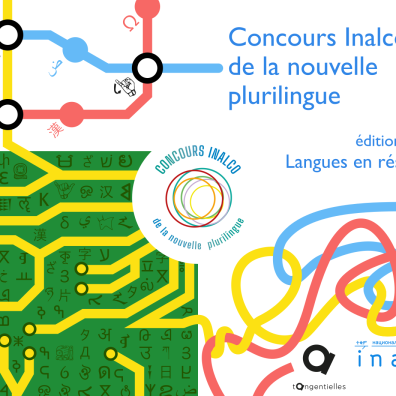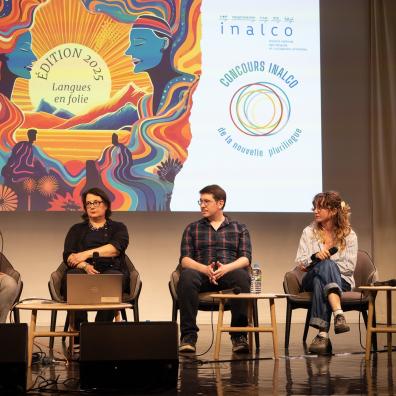Inalco multilingual short story competition

How can we read the dialogue of languages - which is also the dialogue of everyday life in our globalized world - in a literary text? It's the tension between French and other languages, both those that are antipodes to it and those that are closest to it, but also between so-called "standard" or "reference" French and its social and geographical varieties (verlan, joual, Creole languages, nouchi, Marseillais, etc.) that we propose to explore in the Inalco Multilingual Short Story Competition. This competition imposes a single, decisive linguistic constraint: that of using at least one other language or variety of French in addition to so-called "standard" French.
Because of its openness to the world (over a hundred languages are taught here, including many so-called "rare" and minority languages), no venue lends itself better than Inalco to hosting such a competition. The inclusion of the first two editions of the competition within the framework of the OIF's Langues en dialogue program, which promotes a multilingual Francophonie, has reinforced this linguistic openness to French-speaking areas, where French takes on a variety of forms that are all too often invisible. It is this internal plurilingualism of languages - whose homogeneous character is only a factitious construction - and this rustling of language, in the French-speaking and digital space, that this competition aims to promote, particularly for French, whose singularity masks its diversity.
Isabelle Cros, Jury President
2026 edition: Networked languages
For the sixth edition of the competition, the theme "Networked Languages" has been chosen. From social networks to resistance networks, from AI and its neural networks to influence or transport networks... This broad theme invites us to think about the links that are woven between languages, to what they share, knot and untie, to everything that allows us not to think of them as isolated, lonely, but as alive with all these connections that bind and link them.
The deadline for submissions of texts and digital creations has been set for February 3, 2026. To find out more about how to enter and to read the rules, visit the competition website.
Jury composition
The jury, made up of outside personalities, teaching/research and administrative staff, as well as Inalco students, is set up by the Multilingual Short Story Competition organizing committee. A first jury pre-selects the best texts; the final jury, made up among others of the writers et ecrivaines sponsoring the competition, as well as personalities from the book world, representatives of Inalco and Éditions Tangentielles, chooses the three winners of the prize list and possibly awards a special mention (the Grand Jury's coup de coeur, with no award other than honorary).
The following prizes are awarded
- 1st prize: €500
- 2nd prize: €200
- 3rd prize: €100
- "Digital writing" prize: 400 €, and promotion and distribution of the work online as well as in the Editions Tangentielles book and at various events linked to the competition
The best short stories selected by the final jury, between 3 and 12 short stories, depending on the year, are published at Editions Tangentielles with editorial support. Their authors are invited to take part in a workshop led by one of the competition's sponsors or by a speaker specializing in creative writing, to prepare their text for editing and publication.

Send your short story or digital work before February 3, 2026

Discover the winners of the 2025 edition of "Langues en folie".
Edition 2025: Langues en folie
Edition 2025: Langues en folie
- 1st prize: Silans, Marion MICHEL
- 2nd prize: Abandon du phonème, Iris-Aléa REINALD
- 3rd prize: Babel et la malédictions des langues, Martin LEBIGRE
- Prix d'honneur: Mes bouts de langue, Justine VOLFF
Publication of ten short stories in the collective work Langues en folie (publication summer 2026):
- Silans, Marion MICHEL
- La pluie du Guilan, Sarah KONDORY
- Gaddé Waddé, Nagina MAMUZAI
- Five and Thursday on you, Auns DAROUAZ-KHECHINE
- Quatro Dias, Noah LE SAUCE
- Le petit misérable, Obed-Michael MWILAMBWE
- Person Age, Savannah DEKKER
Edition 2024: Langues animales
Edition 2024: Langues animales
- 1st prize: Ariel et Matok, Sandrine MERLIN
- 2nd prize: Elza Formicae, Samuel RUBEO
- 3rd prize: Ces mots emplumés, Hélène ROUX
- InCIAM "digital writing" special prize: Voix nomades, empreintes animales, Adnan BOUDJELAL
Special Jury Mention: Les lettres isolées, Mohamed TOUENTI
Coup de coeur InCIAM prize: Le monde des communicateurs non humains, Brando RUSSO
Publication of nine short stories in the collective work Langues animales (publication October 2025):
- Ariel et Matok, Sandrine MERLIN
- Elza Formicae, Samuel RUBEO
- Ces mots emplumés, Hélène ROUX
- Les lettres isolés, Mohamed TOUENTI
- 52 Hz, Beatrice RIVERON
- D’autres voix que la tienne, Diane COUTELIER
- Mathilde, Tatiana BESSER
- Le chien rouge, Paul BELLEVILLE
- Parole sauvage, Clémence DELHAYE
Edition 2022: Langues en germe
Edition 2022: Langues en germe
- 1st prize: Tout ce qui vit sauf nous, Simon LHERITIER
- 2nd prize: Les vrilles de sa vigne, Jeanne MESLIN
- 3rd prize: Petit bout, Amélie SCHÜNING
- Special InCIAM "digital writing" prize: Les évaporés, Ed Snowcrash
Publication of the winners' short stories (except the InClAM prize-winning creation) as a self-printing fanzine Langues en germe.
Edition 2021: Langues en danger
Edition 2021: Langues en danger
- 1st prize: Vermoulures vert mots rus et murmures, Erwan THOMAZO
- 2nd prize: Maghyal à la campagne, Paul CHOUQUET
- 3rd prize: Le murmure, Lucie EVRARD
- Special PERL "digital work" prize: Silence, Ed Snowcrash
Special mention from the competition sponsors (Carole Martinez and Jean-Luc Raharimanana): Kraké, Alexandre TECHER
Publication of twelve novuelles in the collective work Langues en danger :
- Vermoulures vert mots rus et murmures, Erwan THOMAZO
- Maghyal à la campagne, Paul CHOUQUET
- Le murmure, Lucie EVRARD
- Kraké, Alexandre TECHER
- The Last Languages Fight, Marianne FAVRE
- L'éteneuc, Nicolas PAYEN
- MK5, Soline MORTEROL
- Va'ama, Anton GOUBIER
- Aminti, Laurene BARBIER
- Lexi(e)que universel, Orianne LAZERAT
- Nè mode pa - Ne disparais pas, Elena BECHET
Edition 2020: Langues en dialogue
Edition 2020: Langues en dialogue
- 1st prize: Kyrie Eleison, Valérie ROUMELIOTIS-OTTAVY
- 2nd prize: L'accent, Jean-Yves PELISSON
- 3rd prize: Jnawhi, Samia HANACHI
Special mention from the competition sponsors (Yasmine Khlat and Jean-Simon DesRochers): A Babil, Nicolas PAYEN
Publication of twelve short stories in the collective work Langues en dialogue(s) :
- Kyrie Eleison, Valérie ROUMELIOTIS-OTTAVY
- L'accent, Jean-Yves PELISSON
- Jnawhi, Samia HANACHI
- A Babil, Nicolas PAYEN
- Babel, Eveline SU
- Bifurcation, Celia HOSSTETTER
- Chaque jour est une vie, Alondra
- Fleurs de nostalgie, Paolo FALCONE
- La Belle province, Mario GHEZA
- La sondité, Renaud DESCAMPS
- Les mots déraillés, Werner GABOREAU
- Oridjinns, Najat SGHYAR